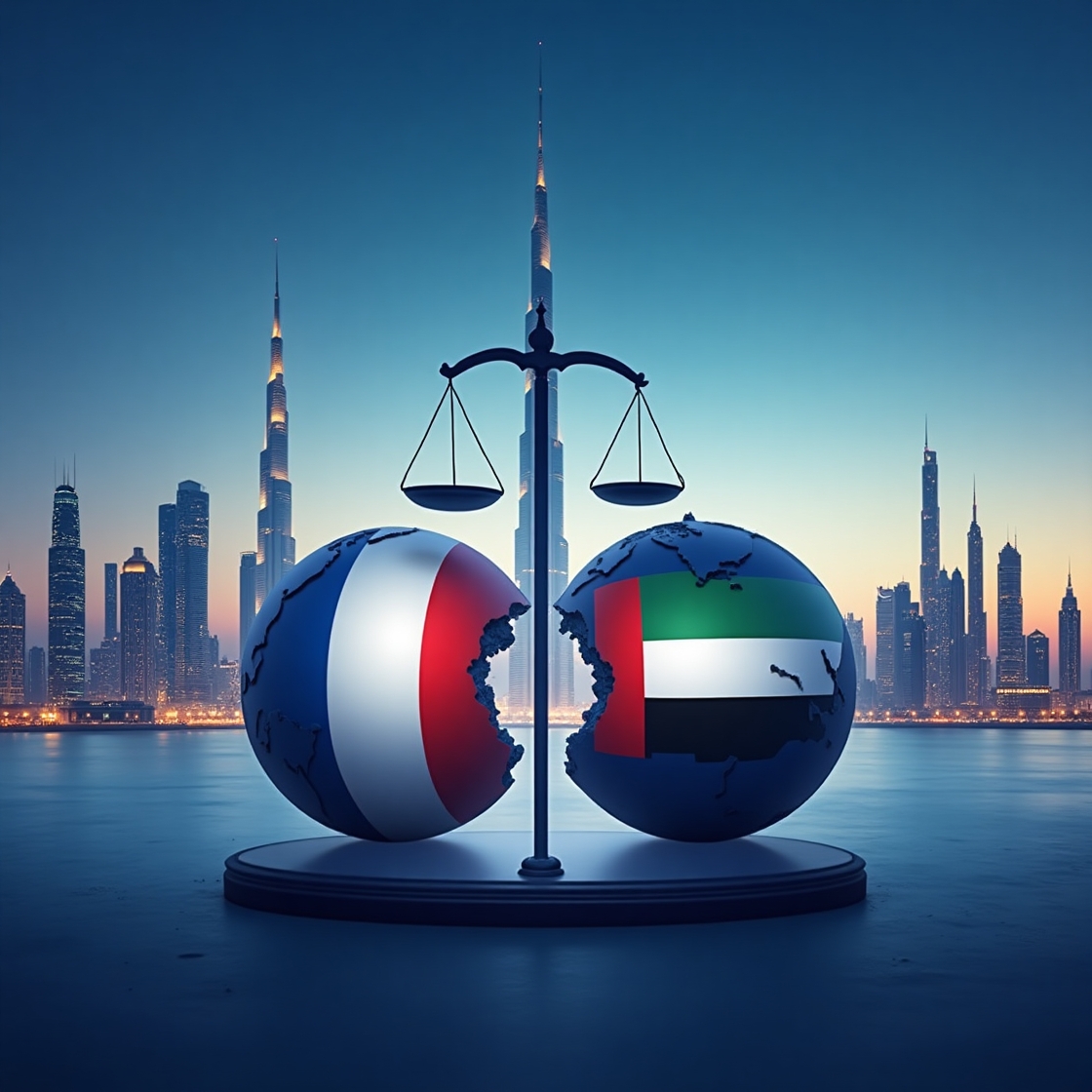
Extradition between Dubai and France
Faced with the threat of extradition between the UAE and France and in need of qualified legal support from the requested state, particularly under an extradition agreement signed between the two nations?
Our team of experienced lawyers will help protect your rights and ensure the most effective legal position in situations of any complexity, including potential appeals to the federal supreme court.
We specialise in extradition matters and are well-versed in the intricacies of interaction between law enforcement and judicial authorities in the legal and judicial fields of UAE and France. Our experienced specialists ensure competent defence in the courts of the United Arab Emirates and France.
They respond quickly and effectively to extradition requests and Interpol notifications, prepare all necessary documents, and prove the unfoundedness of the request for your extradition. We successfully resolve the most complex cases, particularly those involving money laundering, drug trafficking, and combat global crimes, guaranteeing confidentiality and efficiency.
Extradition in France
Extradition is a legal procedure for transferring individuals from one state to another for criminal prosecution or the execution of a court sentence. France has a clearly developed and comprehensive legislative framework, including the code of criminal procedure, regulating the extradition procedure.
In France, the extradition procedure is detailed in articles 696–696-47 of the Code de procédure pénale, which constitutes the fundamental aspects of the code of criminal procedure. This code establishes the key stages and rules of the extradition procedure according to the French code: conditions for granting extradition requests, grounds for refusal of extradition, procedural deadlines and stages of judicial review, and guarantees of the rights and freedoms of the accused person.
The Constitution of France plays an important role in the field of human rights protection within the French Republic, enshrining principles that must be taken into account when carrying out extradition. In particular, the Constitution proclaims a prohibition on the extradition of individuals who are threatened with torture, the death penalty, political persecution, or unfair trial, a principle upheld by the French government.

France actively participates in international legal cooperation and is a party to numerous international agreements in the field of extradition, with hopes for more agreements in the future. In particular, the state is a participant in the international convention, European Convention on Extradition of the Council of Europe from 1957, and several additional protocols. The main provisions of the convention: the principle of double criminality, the possibility of refusal to extradite in cases of political persecution, guarantees against the application of the death penalty, prohibition of double jeopardy.
France has bilateral extradition treaties with a large number of states. Such agreements specify the specific conditions for the extradition of individuals, types of crimes, and the circumstances under which the UAE approves extradition.
As a member state of the European Union, France applies a special mechanism for simplified extradition between EU countries – the European Arrest Warrant. It was implemented within the EU by the Council Framework Decision of 13 June 2002 and has been in effect since 2004. The main goal of the European Arrest Warrant is to simplify and expedite the procedure for transferring accused and convicted individuals between EU countries, reduce bureaucratic delays, and ensure effective combat against crime.
Our company has significant experience in handling extradition cases in France and follow the best practices applied in international law. We offer comprehensive defence and consultancy in cases of drug trafficking and money laundering, including cases like that of the French national Mehdi charafa ensuring a thorough analysis of your situation and an effective defence strategy.
The process of extradition in France
The extradition procedure is initiated by a foreign state, which sends an official request to the French authorities. French law authorises prosecution in France, even if they are committed by a foreigner abroad. The request must specify:
- Personal details of the wanted person (Full Name, date of birth, citizenship);
- The essence of the accusations or the verdict confirming the punishability of the article of criminal law;
- An arrest warrant or sentence issued by a competent court in the requesting country.
An extradition request may be sent to France through diplomatic channels (via the Ministry of Foreign Affairs) or through the Ministry of Justice, and sometimes it is supported by a Red Notice.
The Ministry of Foreign Affairs, together with the Ministry of Justice of France, are verifying whether the request meets formal requirements: translations of documents, compliance of information about the crime, the presence or absence of a corresponding extradition agreement. If the initial check is passed, the documents are sent to judicial authorities.
When the French police and gendarmerie receive information about a person on the wanted list, they can detain them for the duration of the check. This often happens based on an international warrant (Interpol) or a temporary arrest issued by a judicial authority in France under the French code.
The Procureur de la République is notified of the detention; thereafter, the materials are transferred to the General Prosecutor’s Office at the Cour d’Appel, which handles matters of international criminal assistance. The chamber examines the legality of the request, the presence of risks to human rights, and compliance with extradition principles.
Court hearings take place in the form of hearings, where the arguments of the parties are considered. The detainee is present either in person or in custody. After the hearing, the chamber delivers a conclusion (avis).
At the end of the review, the Chambre de l’instruction delivers a conclusion on whether extradition can be granted or should be refused. If the chamber approves extradition, the final decision to surrender the individual is made by the Prime Minister. this decision can be appealed in the Cour de Cassation. If the highest judicial authority does not find procedural violations, then the decision will be final.
Extradition to the UAE
The United Arab Emirates is an active participant in international legal relations, therefore, the issue of extradition is regulated in considerable detail.
Extradition to the UAE is regulated by a set of laws and international extradition agreements signed, among which Federal Law No. 39 of 2006 on Mutual Judicial Cooperation in Criminal Matters holds key significance. This central regulatory act defines the procedure and conditions under which individuals may be extradited, as well as describes the mandatory procedures for reviewing and executing requests from foreign states.
An important role is played by the provisions of the UAE Constitution, which enshrine fundamental human rights and principles of justice. The Constitution is the supreme law of the country, and it establishes guarantees for the protection of the rights of accused persons. In addition, the norms of the Federal Penal Code are also applied, which can be used to verify the compliance of extradition requests with the norms of national legislation.
In addition to internal laws, the UAE actively concludes bilateral and multilateral international agreements concerning extradition. Among such agreements are bilateral extradition treaties with a number of states, as well as regional agreements within the framework of the League of Arab States and the Gulf Cooperation Council (GCC), which provide for simplified procedures for the surrender of individuals, based on an extradition agreement signed with each state.
Conditions of extradition from the UAE
When considering an extradition request, the UAE authorities verify its compliance with the following main conditions:
- Dual Criminality. For the request to be satisfied, the act must be recognized as a criminal offense in both jurisdictions;
- Non bis in idem. The UAE does not allow the extradition of a person for a crime for which they have already been convicted or acquitted, especially if the punishment has already been served or the person has been fully acquitted in court.
- Guarantees of human rights observance. The state is obliged to refuse extradition if there is a risk that the persons sought for extradition will be subjected to torture or cruel treatment or if there is a risk of the death penalty being applied;
- Statute of limitations. Extradition is not carried out if the statute of limitations for criminal prosecution has expired under the legislation of one of the parties;
- Political motivation. It is prohibited to extradite individuals persecuted for political, religious, racial, or other discriminatory motives;
- The minimum term of punishment. Extradition is applied if the crime provides for a punishment in the form of imprisonment for a term of not less than one year;
- Procedural requirements. The extradition request must be properly prepared and contain all the necessary information and documentation as established by legislation or international agreements.
Despite numerous guarantees, in practice, many contentious situations arise. The UAE sometimes uses extradition for debt recovery or resolving disputes related to unpaid cheques, which is criticised by human rights organisations. However, formally this is permitted under UAE national legislation.
The process of extradition in the UAE
A foreign judicial or law enforcement authority prepares a package of documents: an arrest warrant, a verdict, and investigation materials. The request is sent through the channels of the Ministry of Foreign Affairs, Justice, or via diplomatic missions.
The request is sent to the authorised structures of the UAE: the Ministry of Justice and the General Prosecutor’s Office. They check for the necessary details: personal information, copies of court decisions or rulings. They also verify whether a bilateral extradition treaty between the UAE and the requesting state is in effect.
Simultaneously, the request may be supported by a Red Notice, enabling local law enforcement agencies to quickly learn about the wanted individual and detain them upon entry or when found within the UAE territory. After the arrest, the police notify the UAE prosecution, which will subsequently handle the case and liaise with the authorities of the foreign state.
It is not uncommon for extradition cases to be considered in UAE courts (specialised courts or chambers), where both the prosecution and defence have the right to present their arguments. The Abu Dhabi Federal Court evaluates the compliance of the materials with the received request and UAE national legislation. In some cases, the UAE Ministry of Justice – through the federal supreme court, together with the General Prosecutor’s Office- carries out the final decision approving the surrender. If the federal supreme court proceedings have supported extradition, the ministry may give its final approval and organise the transfer of the individual.
When a discrepancy is identified (absence of corpus delicti, political motives, risk of torture) or in the case of procedural violations, the court/prosecution may refuse extradition, and the person will be released once the decision comes into force. The party disagreeing with the decision may file an appeal through the Federal Supreme Court.
If you or your loved ones, as the requested person, are faced with an extradition request, it is crucial to consult specialized lawyers who have experience in the field of international criminal law and are familiar with the intricacies of the judicial system of the Emirates. Our company is ready to provide comprehensive support within the criminal procedure, from analyzing the request materials to defense in the Abu Dhabi Federal Court and appealing a possible decision.
The latest news on extradition between the UAE and France
In recent months, the Dubai extradition to France has demonstrated the effectiveness and commitment of both countries to fighting global crimes, which will further enhance cooperation in extradition matters.
Extradition of drug dealer Mehdi Sharaf from the UAE to France
French national Mehdi Charafa was, for a long time, on the international wanted list on charges of large-scale drug trafficking and money laundering. French law enforcement authorities accused him of organising a major criminal network involved in smuggling narcotics, primarily cocaine and heroin.
After his criminal activities were uncovered, the French authorities issued an arrest warrant and placed him on the international wanted list through Interpol. Subsequently, Sharaf was detained by the UAE authorities.
The Abu Dhabi Federal Court initially approved the extradition; however, Sharaf contested this decision and subsequently appealed to the Supreme Court. The Federal Supreme Court rejected the request and made the decision approving his extradition.
The extradition of French national Mehdi Charafa is a demonstrative example of successful international cooperation in the fight against organised crime. This case highlighted the effectiveness of existing mechanisms of interaction between France and the UAE and strengthened their authority on the international stage in matters of combating drug trafficking and financial crimes, particularly concerning individuals of French nationality.
What to do if you are facing extradition?
If you have learned about a possible extradition request for the requested person or have already been detained on its basis, the first and most important step is to contact an experienced lawyer specialising in international criminal law. Extradition cases are highly legally complex and involve legal procedures to combat global crimes, so choosing a competent lawyer is crucial to navigating the potential legal consequences. An experienced solicitor will be able to quickly assess the legality of the extradition request, identify grounds for refusal or appeal, develop a well-thought-out defence strategy, and gather the necessary evidence.
An extradition request is often accompanied by the so-called red notice of Interpol. It signals law enforcement agencies worldwide about a person’s search. If you frequently travel internationally, this is particularly critical, as you may be detained when crossing the border. Lawyers can promptly request information from Interpol and check your status. If necessary, they can appeal the presence of a red notice or request its cancellation.
There are several legal grounds on which an extradition request can be challenged:
- The absence of double criminality – if the act is not recognised as a criminal offence in the country of your residence;
- Political persecution – if the extradition request is motivated by political reasons;
- Human rights violations – if there is a threat of torture, cruel treatment, or the death penalty in the requesting country;
- Non bis in idem – you have already been convicted or acquitted for this crime;
- Expiration of the statute of limitations – if the statute of limitations for prosecution has expired according to the laws of both countries.
Determining the presence of such grounds for refusal is the task of your solicitor.
It is extremely important to collect all documents and evidence supporting your position promptly. These may include documents regarding the termination of the case or an acquittal in another country, evidence of the political motivation behind the request, as well as documents confirming violations of your rights or potential threats in the event of extradition (reports from human rights organisations, medical certificates, and other documents). Lawyers will help to properly prepare and submit these documents to judicial and other competent authorities on time.

If the decision of the court of first instance is unfavorable for you, this does not mean that the fight is over. Most countries provide an appeal mechanism that allows the legality of extradition to be re-examined. At this stage, additional arguments and evidence may be presented. An appeal offers a chance for the case to be reviewed and an opportunity to protect you from unjust extradition.
In some cases, a person can be released on bail or placed under house arrest while awaiting the court’s decision. The possibility of release on bail depends on the legislation of the country and the nature of the crime for which extradition is being requested. Your solicitor will help examine and utilise all available options for release to ensure the maximum level of comfort and freedom until the final decision.
Schedule a consultation with extradition lawyers in the UAE
Our team of lawyers has extensive experience and specialisation specifically in the field of international extradition, which enhances efforts to protect our clients’ rights . We have an excellent understanding of how the legal system in the UAE works, and we aim to enhance cooperation to protect clients’ interests, and are skilled at finding solutions even in the most complex situations.
We will carefully examine all the details of the specific case, develop a personalised defence strategy, and provide full support at every stage of the extradition procedure, including any necessary arrangements for provisional arrest. Our lawyers have significant experience working with local courts and law enforcement agencies in various legal and judicial fields. , which allows us to effectively utilise UAE legislation under judicial supervision in the interests of our clients.
In extradition cases, time plays a decisive role. Our team acts promptly within the territorial jurisdiction, quickly responding to changes in the situation, which allows us to avoid unwarranted delays and ensure the protection of rights at critical moments through a direct request to the authorities.
Our team provides a wide range of legal services, including defence strategies against allegations of money laundering.
- Legal analysis of the request: verification of compliance with UAE legislation and international standards, assessment of risks and opportunities for successful contestation of the request;
- Defence in UAE courts: representation of the client’s interests in courts of all instances, preparation and submission of procedural documents, appeals and complaints aimed at refusal of extradition or its suspension;
- Interaction with law enforcement agencies: legal support at all stages of detention and investigation of the case;
- Removal of Interpol notices: assistance in checking Interpol status and cancelling red notices, providing evidence of illegality or groundlessness of international search.
- Consultations: expert consultations on issues of international extradition, human rights protection, and criminal legislation of the UAE, consultations regarding risks during international travel and business activities abroad.
Contact us right now for an initial consultation, we will promptly offer optimal legal solutions and immediately begin working to protect your interests. Together, we will overcome any legal challenges and ensure your safety in the situation of international extradition.





